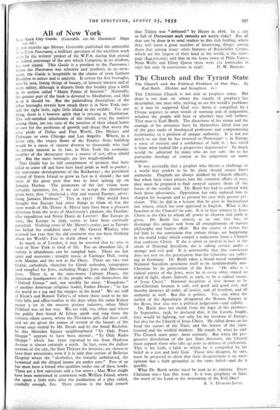The Church and the Tyrant State
THE Christian Church is not rich in prophets today. But there is one man on whom the mantle of prophecy has descended; one man who, striving to see the world's problems as it may be supposed God sees them, is compelled by a Divine urgency to utter words of warning and of judgement, whether the people will hear or whether they will forbear. That man is Karl Barth. The directness of his vision and the courage of his utterance have by themselves lifted him out of the grey ranks of theological professors and compromising ecclesiastics to a position of unique authority. It is not too much to say that he has restored to Protestanti--.1 in Europe a sense of mission and a confidence of faith th :t has saved it from what looked like a progressive degeneration So much would be admitted by many who do not subs _.-ibe to his particular theology or concur in his judgement on many matters.
It was inevitable that a prophet who throws a challenge to a world that prefers to be let alone should arouse bitter animosity. Prophets are always disliked by Church officials; but when their voice pierces into the common affairs of men, they must be prepared to find arrayed against them all the forces of the secular arm. Dr. Barth has had to contend with both these adversaries. Opposition has only induced him to sharpen his weapons and to present his case with greater pre- cision. This he did in a lecture that he gave in Switzerland last winter, which has now appeared in English. What is the function of the Church? he asks. It is to bear witness to Jesus Christ as the One to whom all power in 1-leaven and earth is
given. Dr. Barth has striven, as no one else has, to disengage this unique task from all entanglements of human philosophy and human effort. But the course of events has led him to the conviction that certain things are happening in the world today which compel a judgement from a Church that confesses Christ. If she is silent or neutral in face of the claim of National Socialism, she is taking service under a strange and evil god. It is noteworthy that this conviction does not rest on the persecution that the Churches are suffer- ing in Germany. Dr. Barth takes a broad moral standpoint. National Socialism proclaims itself to be fundamentally anti- Christian by its persecution of the Jews. " He who is a radical enemy of the Jews, were he in every other regard an angel of light, shows himself, as such, to be a radical enemy of Jesus Christ." National Socialism is also shown to be anti-Christian because it calls evil good and good evil, and thereby destroys all order, all justice, and all freedom, and all authority as well. But this is politics. Yes, and when the author of the Apocalypse designated the Roman Empire as the Beast, that also was a political judgement—and rightly.
Dr. Barth does not shrink from the logic of his premises. In September, 1938, he declared that, if the Czechs fought, they would be fighting, not only for the freedom of Europe, but also for the Church of Jesus Christ. He called down on his head the curses of the Nazis and the horror of the faint- hearted and the wishful thinkers. He stands by what he said. The Church must pray : most certainly. But when the pro- gressive dissolution of the just State threatens, the Church must support those who take up arms in defence of civilisation. This is his faith, a faith to which he is compelled by his belief in a just and holy God. Those who disagree, he says, must be prepared to show that their disagreement is no mere opinion but a faith grounded in the same belief—and do it quickly.
What Dr. Barth writes must be read in its entirety. Every Christian must face this issue. Is it true prophecy or false, the word of the Lord or the inspiration of the Evil One?
A. S. DuNcAN-JONES.








































 Previous page
Previous page